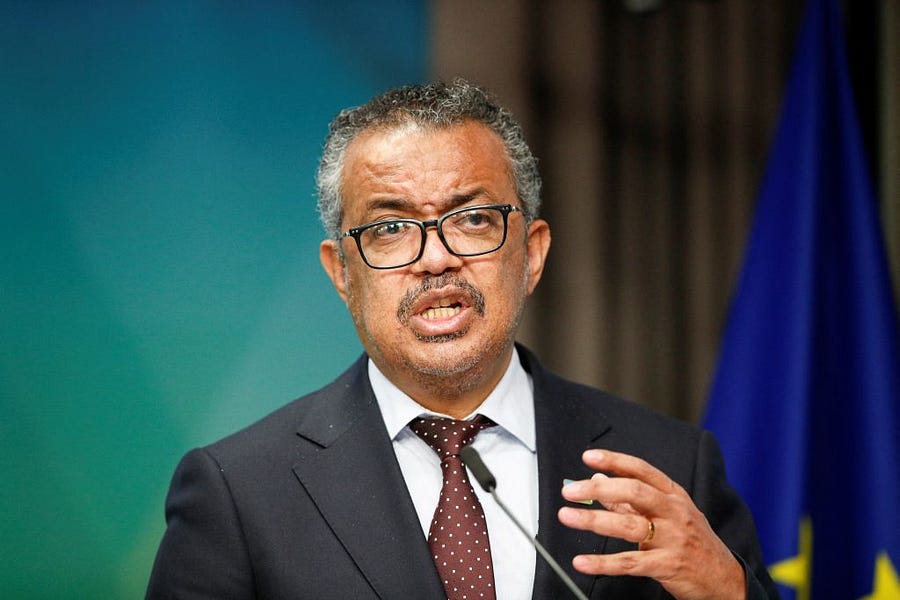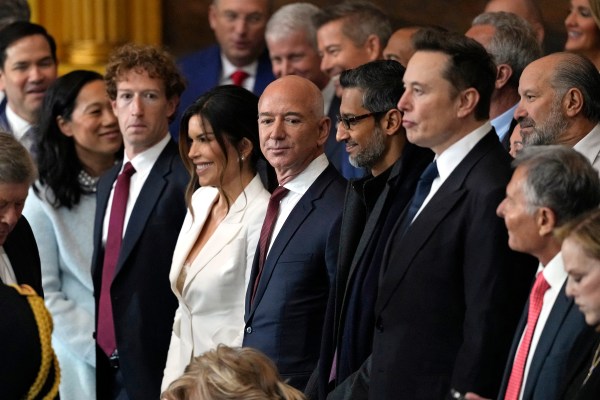President Joe Biden, in one of his first acts in office, reversed his predecessor’s decision to withdraw from the World Health Organization (WHO). The Biden administration emphasized that it would strengthen and reform the WHO from within. On Sunday, the WHO’s 194 member states will gather in Geneva for the 75th World Health Assembly (WHA) and vote on reforms that would enhance WHO authority and limit the autonomy of national governments. In isolation, some of these reforms are perfectly sensible. Yet the WHO and its director general, Tedros Adhanom Ghebreyesus, remain beholden to China, a problem that Biden has no apparent plan to correct. Thus, in practice, enhancing WHO authorities plays into the hands of Beijing rather than promoting actual reform.
The Biden administration’s pivotal failure in dealing with the WHO was its inexplicable decision not to field an alternative candidate for director general. Tedros is unopposed for another five-year term, even though he amplified Beijing’s obstruction and obfuscation in the critical early days of the COVID-19 pandemic. On January 29, 2020, Tedros said, “I will praise China again and again, because its actions actually help in reducing the spread of coronavirus to other countries.” Those comments were as wrong then as they are shocking in hindsight. Just one day later, Tedros declared the COVID-19 outbreak a public health emergency of international concern (PHEIC).
In January 2022, the WHO Executive Board (whose members include Russia and Syria) formally nominated Tedros for a second term, and the WHA will officially appoint him in Geneva. With his reelection secured, Tedros proposed an expansion of the director general’s control of the organization’s budget. Currently, the director general controls only the 20 percent of the WHO budget that comes from mandatory member state contributions. The remaining 80 percent consists of voluntary contributions that member states and non-governmental organizations earmark for specific programs. Tedros wants mandatory payments to make up half of the WHO’s $2 billion budget by 2028. The Biden administration initially opposed this plan, while U.S. allies in Europe supported it. The administration eventually agreed to the change in late April, when Tedros announced an agreement that will take effect in 2024.
The Biden administration itself proposed other reforms the WHA is likely to ratify. On January 20, the United States proposed amendments to the International Health Regulations (IHR), a “legal framework that defines countries’ rights and obligations in handling public health events and emergencies that have the potential to cross borders.” The WHO coordinates IHR implementation and helps build the capacity of member states to follow the IHR. The regulations were last updated in 2005 following China’s unsuccessful efforts to hide the SARS outbreak of 2003. While many of the Biden administration’s suggestions are constructive when considered on their own, China’s pervasive influence and Tedros’ poor management render the U.S. proposals either irrelevant or even harmful in practice.
Biden’s proposed amendments alter the procedures for declaring a PHEIC. In the early days of the COVID-19 pandemic, Beijing hid information from the WHO and the public that exacerbated the impact of the outbreak. The existing IHR requires the concurrence of the affected state party before the director general can trigger a PHEIC but the U.S. amendments remove that requirement. The director general must invite the affected state party to present its views to the emergency committee, which is charged with advising the director general on whether to declare a PHEIC. The director general is also required to consider information from the affected state party and other state parties.
Biden’s IHR proposals also increase WHO powers in other ways. If the director general determines an event does not rise to the level of a PHEIC but does require “heightened international awareness and a potential international public health response,” the amendments would allow him to issue an “intermediate public health alert.” The U.S. amendments also allow WHO regional directors to declare that an event constitutes a “public health emergency of regional concern.” There is no clear process for making these determinations, nor do the amendments clarify whether an affected state party can block them. The Biden administration needs to ensure clarification so these changes do not become a blank check for WHO to assert itself.
In principle, these changes limit the ability of China and others to block WHO action at the outset of a pandemic or other public health emergency, but for as long as WHO leadership is beholden to Beijing, procedural changes are mostly irrelevant. State parties can reject or express reservations about the amendments six months after WHA adoption. The amendments take effect six months after that period. Members of Congress should insist that the Biden administration address concerns about possible infringement on U.S. sovereignty. What provisions are in place, or could Congress enact, to ensure that WHO leadership is not dictating U.S. public health policies?
The Biden administration is also recommending the creation of an IHR compliance committee to monitor adherence to the regulations. The proposal is a middle ground between the status quo of zero enforcement and real sanctions for violating the IHR. While there is merit to ensuring member states implement the IHR, the Biden administration has not explained how this committee would operate. With Tedros in charge, the committee may do nothing to address China’s misconduct.
Another issue for Biden is that the WHO empowers dictatorships while marginalizing democratic governments, especially those of Taiwan and Israel. Syria’s Assad regime bombs hospitals but is entering its second year on the WHO’s Executive Board, which implements “the decisions and policies of the [World] Health Assembly, and advise and generally to facilitate its work.” The Russian Federation is attacking health care facilities, including a children’s hospital, in Ukraine and is in its third and final year of its current term on the board. The deputy speaker of Russia’s State Duma said Moscow could withdraw from the WHO, which would be a welcome development, yet it may realize it can cause more damage by obstructing it from within.
Meanwhile, Tedros will likely exclude Taipei from participating as an observer at the WHA. Secretary of State Antony Blinken issued a strong statement of support for Taiwan’s inclusion, but this is a futile gesture given the administration’s support for Tedros’ re-election. Similarly, there is a full day at each WHA reserved for negative reports about Israel, even though no other government faces such scrutiny. This remains a convenient distraction from the hospital bombings carried out by Russian and Syrian forces, or Beijing’s mass sterilization of its Uyghur minority.
Another big change in the works, although not for this year, is a treaty “to strengthen pandemic prevention, preparedness and response.” The WHO’s intergovernmental negotiating body (INB) began public hearings last month. The INB’s ambitious schedule includes consideration of a working draft by the week of July 18. The group will provide a status update at next year’s WHA. The WHO expects to discuss and potentially adopt a pandemic treaty at the 77th WHA in May 2024.
The contours of the treaty are unclear but the recent rhetoric on pandemic preparedness is not promising. The Bill and Melinda Gates Foundation, the WHO’s third-largest donor, will be an influential player in this process. Bill Gates published a new book, How to Prevent the Next Pandemic, and recommended a permanent 3,000-person team, managed by the WHO, focused on pandemic preparedness. As with the IHR reforms, this is not a bad idea on its own. But what is the point of such changes if the WHO cannot address the problem of Chinese influence? In his book, Gates does not even consider how to deal with China’s obstruction and obfuscation in the initial days of the COVID-19 pandemic.
Both the Biden administration and Tedros have a similar blind spot. Both have moved on from efforts to determine the origins of the COVID pandemic. When Tedros visited Washington last month, the subject was not mentioned in readouts of his meetings with Treasury Secretary Janet Yellen or Health and Human Services Secretary Xavier Becerra. The issue was relegated to the readout of Tedros’ meeting with Deputy Secretary of State for Management and Resources Brain McKeon. Yet elaborate plans for preventing the next pandemic have little value if the United States and WHO refuse to learn the lessons of this one.
In light of all these problems, Congress should begin oversight of the administration’s pandemic preparedness initiatives. This could start with hearings with the Departments of State and Health and Human Services on the IHR regulations, China’s influence in the WHO, and the organization’s substandard management. Since their votes will be necessary to ratify a pandemic preparedness treaty, senators should influence the negotiations by insisting that the treaty pass a simple test: If it existed in January 2020 would it have prevented China from hiding the COVID-19 pandemic?
Biden said he would reform the WHO, but expanding the powers of a director general who helped hide a global pandemic achieves just the opposite. The administration ought to adjust its course or risk facilitating the emergence of another pandemic.
Anthony Ruggiero is a senior fellow at the Foundation for Defense of Democracies. He previously served in the U.S. government for more than 19 years, including as senior director for counterproliferation and biodefense (2019-2021) on the National Security Council. Follow Anthony on Twitter @NatSecAnthony. FDD is a Washington, D.C.-based, nonpartisan research institute focused on national security and foreign policy.






Please note that we at The Dispatch hold ourselves, our work, and our commenters to a higher standard than other places on the internet. We welcome comments that foster genuine debate or discussion—including comments critical of us or our work—but responses that include ad hominem attacks on fellow Dispatch members or are intended to stoke fear and anger may be moderated.
With your membership, you only have the ability to comment on The Morning Dispatch articles. Consider upgrading to join the conversation everywhere.